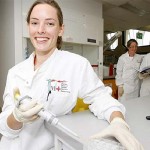
Rosie Clark
Neuroscientist
The brain is a truly wonderful and complex thing- a tangled web of billions of nerve cells, called neurons, which work together in perfect harmony to create the most powerful computer in the world. Amazingly complex and capable, our brain manages our every thought and action as well as all the things we do without even thinking about it. I am one of the people who study the brain and want to understand it better. I am a neuroscientist.
So what is a neuroscientist? There are many different types of neuroscientists who ask many different types of questions. Some investigate how neurons talk to each other; others investigate how they wire together. I investigate what happens when they fail and what causes them to fail in disease.
And how do you become a neuroscientist? First you have to finish high school and go to college. After that you get a university undergraduate degree and then you can do a research degree in a topic that really challenges and interests you.
After attending ten years of Riverside Primary and High School, I attended Launceston College for two years where I grew a steady interest in the sciences. I then moved to Hobart to undertake a Bachelor of Medical Research (Honours) at the University of Tasmania. During these four years I met some of the most interesting lecturers and researchers who inspired me to be where I am today.
Currently I am undertaking my PhD at the Menzies Research Institute Tasmania in Hobart, investigating what causes a type of neuron, called the motor neuron, to be lost in motor-neuron disease. These types of cells control your ability to move the muscles in your legs, arms and body. Steven Hawking has a rare form of this disease and is an example of what happens when these cells fail. I hope to identify new ways to treat motor-neuron disease and improve the quality of life of those who are affected by it.
As we are only just beginning to understand the complexities of the brain and all its connections, I hope that future neuroscientists continue to help make advancements in this field and add to our growing knowledge. I believe anyone can be a great scientist; all you need to do is strive to be the best at what you are passionate about and challenge yourself and your ideas as these interests grow.
For further information: www.menzies.utas.edu.au; https://www.mndresearch.asn.au/Advance_June2013.pdf.